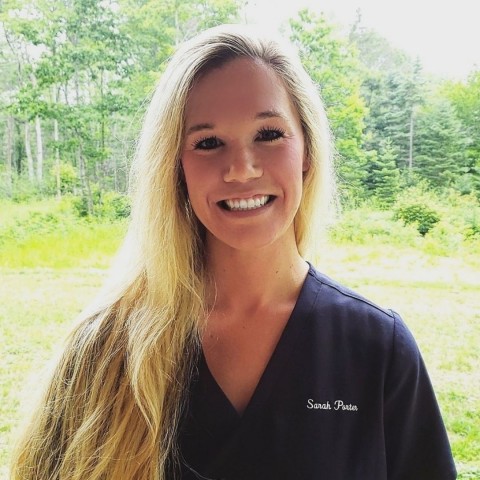Earn Your Master of Science in Physician Assistant Studies at Maine's Leading Health University
UNE’s Master of Science in Physician Assistant degree program — the only PA program in Maine — prepares master’s level physician assistants to be highly skilled members of health care teams.
Our students graduate as knowledgeable, collaborative clinicians trained in providing compassionate, competent, patient-centered health care to people of all backgrounds and cultures throughout their lifespans.
You will begin our program on our Portland campus, then start clinical rotations in your second year. The program can be completed in two years.
Fill out the form below for an info sheet on UNE's M.S.P.A.
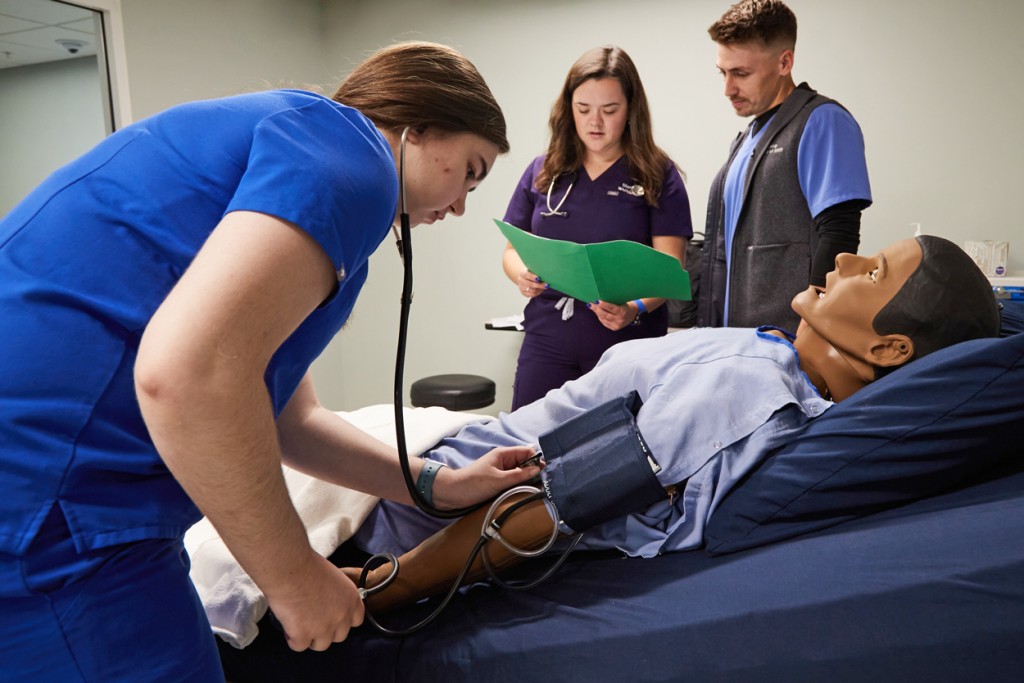
percent of our students who pass the PANCE exam on the first try
Why UNE for Your Physician Assistant Studies
Not only are we the only PA program in Maine, we are also accredited by the Accreditation Review Committee on Education for the Physician Assistant (ARC-PA).
More reasons to choose our PA degree include:
- First-time exam candidates from our PA degree program consistently outperform the national average pass rate, with 98% of our 2023 graduates passing the PANCE exam on their first try (PDF).
- We are a comprehensive health sciences university that is nationally recognized for excellence in preparing students for collaborative, interprofessional, team-based care. Draw on the expertise of faculty members from our colleges of medicine, health professions, dental medicine, and our College of Arts and Sciences, and benefit from training alongside future providers in other health professions.
- Guided by skilled faculty, you receive instruction in the College of Osteopathic Medicine’s gross anatomy lab, and you build your PA skills in our state-of-the-art health care education facilities. Rather than just hearing and reading about difficult or unusual cases, you experience them by treating our high fidelity patient simulators and patient actors in scenarios that mimic real life.
- You gain experience caring for people from different walks of life. Our emphasis on medically underserved populations, including rural communities and the geriatric population, will enhance your skills as a clinician and your sensitivity as a caregiver.
- Enjoy the supportive community of UNE’s Physician Assistant degree program. With encouraging faculty and professional staff and fellow students who embrace a collaborative — rather than competitive — spirit, you are better able to focus on learning the material that will make you the successful PA you strive to be.
- Portland has been named “America’s Most Livable City” by Forbes and “Foodiest Small Town in America” by Bon Appetit. We also have a thriving student life.
What Will You Study? Accredited PA Program Curriculum Overview
Our accredited PA program — the only PA program in Maine — operates on a 24-month, full-time calendar, beginning each June with a new entering class.
You begin patient care in your first year through our nationally recognized Interprofessional Geriatric Education Practicum, which pairs you with an elderly individual from the community whom you visit and evaluate regularly. Through this experience, you enhance your medical knowledge, gain clinical skills, and develop a professional presence to carry into your clinical year.
Our M.S.P.A. degree curriculum is built upon a foundation of science and pathophysiology to foster understanding of disease processes and clinical medicine. You receive two full years of instruction in pharmacology, learn evidence-based medicine theory, and work in small groups to develop the critical thinking skills required to address complex medical and surgical challenges.
By emphasizing all aspects of health care, including geriatrics, health promotion, disease prevention, pharmacology, and public health practice, we empower future physician assistants to work effectively within the physician/PA relationship, exercising autonomy in medical decision making and providing a broad range of diagnostic and therapeutic services.
Curriculum
Phase I of the Program of study consists of 60.5 credit hours in pre-clinical didactic coursework. The summer, fall, and spring terms include instruction in the fields of biomedical sciences, clinical medicine, public health, pharmacology, clinical assessment, anatomy, physiology, evidence-based medicine, ethics and professionalism, specialty disciplines, and geriatrics. Twelve months of clinical rotations will take place upon successful completion of the didactic phase. The Program ends with a final week on campus, which provides a forum for the presentation of students' research projects to peers and faculty, offers assistance in preparing the graduating students for certification, and gives PA candidates an opportunity to integrate the didactic and clinical portions of their training in preparation for the Physician Assistant National Certification Exam (PANCE).
Summer I (June–August, 10 weeks)
| Courses/Program Areas | Credits |
|---|---|
| PAC 555 – Anatomy | 5 |
| PAC 503 – Clinical Assessment I | 2.5 |
| PAC 559 – Pharmacology I | 3 |
| PAC 548 – Principles of Biological Science | 3 |
| PAC 509 – Clinical Medicine I | 1 |
| PAC 582 – Professional and Ethical Issues for Physician Assistants | 1 |
| Semester total | 15.5 |
Fall (September–December, 15 weeks)
| Courses/Program Areas | Credits |
|---|---|
| PAC 554 – Clinical Assessment II | 3 |
| PAC 560 – Pharmacology II | 3.5 |
| PAC 519 – Clinical Medicine II | 8 |
| PAC 564 – Interdisc Geriatric Ed Prog II | 2 |
| PAC 565 – Integrating Seminar I | 3 |
| PAC 543 – Evidence Based Medicine I | 1 |
| Semester Total | 20.5 |
Spring (January–May, 20 weeks)
| Courses/Program Areas | Credits |
|---|---|
| PAC 551 – Introduction to Public Health | 1 |
| PAC 556 – Evidence Based Medicine II | 0.5 |
| PAC 545 – Specialty Disciplines | 7 |
| PAC 585 – Integrating Seminar II | 3 |
| PAC 533 – Clinical Assessment III | 3 |
| PAC 561 – Pharmacology III | 3.5 |
| PAC 546 – Clinical Medicine III | 6 |
| PAC 547 – Interdisc Geriatrics Ed Prog I | 1 |
| Semester Total | 25 |
Spring II–Summer II (June–June, 12 months)
| Clinical Rotations | Credits |
|---|---|
| PAC 670 – Clinical Practicum I | 6 |
| PAC 671 – Clinical Practicum II | 6 |
| PAC 672 – Clinical Practicum III | 6 |
| PAC 673 – Clinical Practicum IV | 6 |
| PAC 674 – Clinical Practicum V | 6 |
| PAC 675 – Clinical Practicum VI | 6 |
| PAC 676 – Clinical Practicum VII | 6 |
| PAC 677 – Clinical Practicum VIII | 6 |
| PAC 614 – Preparation for Clinical Practice I | 1 |
| PAC 615 – Preparation for Clinical Practice II | 1 |
| PAC 616 – Preparation for Clinical Practice III | 1 |
| PAC 628 – Clinical Therapeutics I | 0.5 |
| PAC 629 – Clinical Therapeutics II | 0.5 |
| Semesters (3) Total | 52 |
Graduation Requirements
Students must complete all Program requirements prior to the issuance of their Master of Science degree and the certificate of completion of the program.
Academic and Technical Standards
WCHP Academic Policies
The Department of Physician Assistant, the Westbrook College of Health Professions, and the University of New England are committed to offering a quality Physician Assistant education program that complies with the evaluative criteria of the Accreditation Review Commission on Education for the Physician Assistant. The program provides learning experiences to enable graduates to achieve the outcomes required for the practice of Physician Assistant. Please refer to the WCHP Graduate Program Progression Policies and Procedures (PDF) for a detailed description of academic standards.
Technical Standards
A student in the PA Program must have abilities and skills in five categories: observation, communication, motor, intellectual, and behavioral/social. All students admitted to the Program must meet the following abilities and expectations upon matriculation and maintain these standards while enrolled in the PA Program. In the event a student is unable to fulfill these technical standards, with or without reasonable accommodation, the student will be subject to dismissal after admission.
Reasonable accommodation for persons with documented disabilities will be considered on an individual basis. However, a candidate must be able to perform these skills in an independent manner. Accordingly, the Program requires each student to meet the following technical standards with or without accommodation:
Observation
Students must have sufficient sensory capacity to observe in the lecture hall, the laboratory, the outpatient setting, and the patient’s bedside. Sensory skills adequate to perform a physical examination are required. The ability to acquire sensory input using vision, hearing, and tactile sensation must be adequate to observe a patient’s condition and to elicit information through procedures regularly required in a physical examination, such as inspection, auscultation, percussion, and palpation.
In any case, where a student’s ability to observe or acquire information through these sensory modalities is compromised, the student must demonstrate alternative means and/or abilities to acquire and demonstrate the essential information without reliance upon another person’s interpretation of the information. It is expected that obtaining and using such alternative means and/or abilities shall be the responsibility of the student. The University will reasonably assist the student where necessary.
Communication
The student must be able to effectively and efficiently communicate in the English language using verbal, written, and reading skills, in a manner that demonstrates sensitivity to fellow students, patients, their families, and all members of the healthcare team.
- A student must be able to accurately elicit information, describe a patient’s change in mood, thought, activity, and posture. Students must demonstrate established communication skills using traditional means which may include the use of assistive devices.
- The student must be able to communicate complex findings in appropriate terms for patients/caregivers and other members of the healthcare team.
- A student must be able to communicate clearly and audibly during interactions with classmates, professors, patients, and members of the healthcare team.
- A student must be able to receive, write legibly, and interpret written and verbal communication in both clinical and academic settings.
- The student must be able to interpret and record legibly observations in a manner that is efficient and accurate using handwritten and electronic and dictating formats.
Motor
The ability to participate in basic diagnostic and therapeutic maneuvers and procedures (e.g. palpation, percussion, auscultation) is required. Students must have sufficient motor function to safely execute movements required to provide care to patients. Students must be able to negotiate patient care environments and must be able to move between settings, such as clinic, classroom building, and hospital. Physical stamina sufficient to complete the rigorous course of didactic and clinical study in required. Long periods of sitting, standing, or moving are required in the classroom, laboratory, and clinical experiences.
The student must be able to execute motor movements reasonably required to provide general and emergency diagnosis and medical care such as airway management, placement of intravenous catheters, cardiopulmonary resuscitation, and suturing of wounds. At all times the ability to administer care to patients in a safe manner is paramount.
Intellectual
Students must be able to measure, calculate, reason, analyze, and synthesize information effectively in a precisely limited time as would be appropriate for the individual’s level of training in a given clinical setting, while under stress, and in an environment in which other distractions may be present. Problem-solving, one of the critical skills demanded of PAs, requires all of these intellectual abilities. In addition, students should be able to comprehend three-dimensional relationships and understand the spatial relationships of structures.
Students must be able to read and understand medical literature. The student must be able to demonstrate mastery of these skills and the ability to use them together in a timely fashion in medical problem solving and patient care.
The student must be able to, with or without the use of assistive devices, but without reliance on another person, interpret x-ray, and other graphic images and digital or analog representations of physiologic phenomena (such as EKGs).
Behavioral and Social Attributes
Students must possess the emotional health required for full utilization of their intellectual abilities, the exercise of good judgment, and the prompt completion of all academic and patient care responsibilities. The development of mature, sensitive, and effective relationships with patients and other members of the healthcare team are essential. Flexibility, compassion, integrity, motivation, interpersonal skills, and the ability to function in the face of uncertainties inherent in clinical practice are required.
Students must function professionally and effectively in any academic or clinical setting. Students must always demonstrate the psychological and emotional health required for full utilization of their intellectual abilities, the exercise of good judgment, and the prompt completion of all academic and clinical responsibilities.
The student must demonstrate mature, sensitive, and effective relationships with University faculty and professional staff, peers and classmates, patients and other members of the healthcare team. Flexibility, compassion, integrity, motivation, interpersonal skills, and the ability to function in the face of uncertainties inherent in clinical practice are all required.
For more information on disabilities and accommodation, please contact the UNE Student Access Center at (207) 602-2815.
Grading
Upon completion of a course of study, the faculty member in charge of that course submits the number of hours taught and a grade for each student to the academic coordinator. The M.S.P.A. program uses a standard letter grading system.
To learn more view the Academic Catalog or download the M.S.P.A. Student Handbook (PDF).
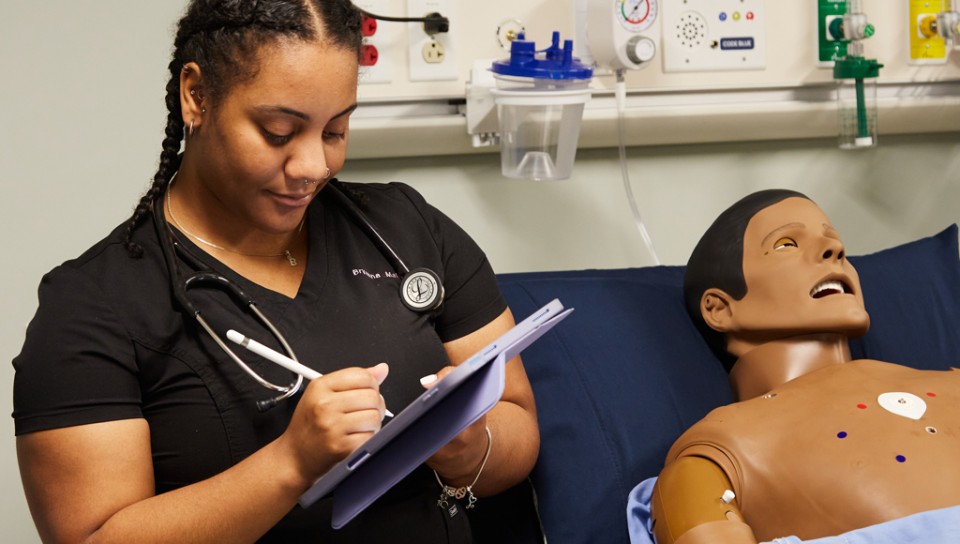
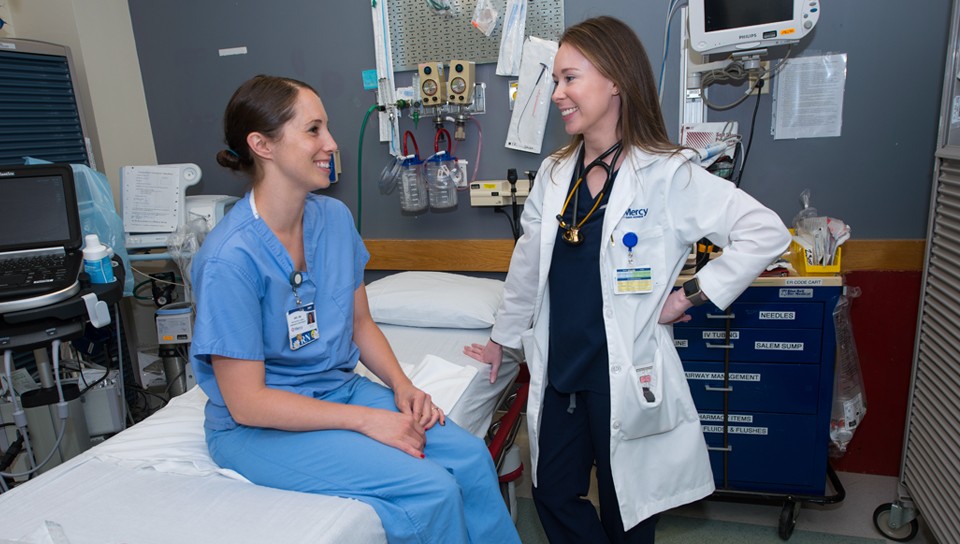
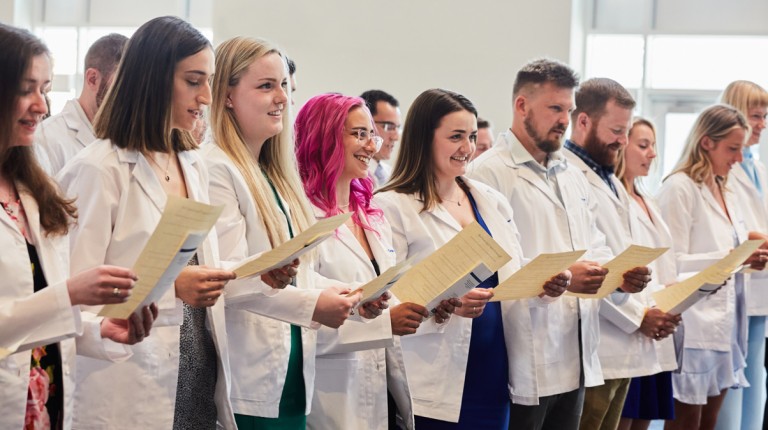
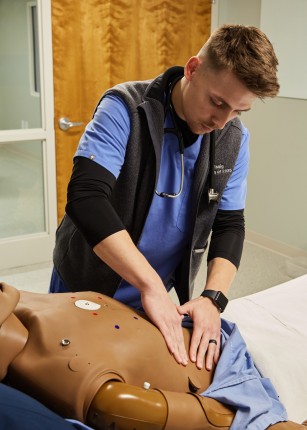
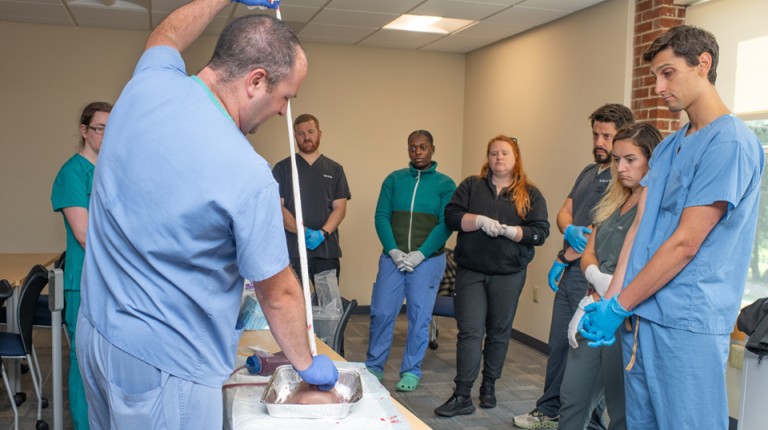
Potential Career Paths for PA Degree Grads
As America’s health care delivery system evolves to meet the needs of medically underserved populations, the demand for affordable primary care providers continues to grow. Physician assistants will play a critical role, and the opportunities available to you as a member of this challenging, rewarding, and lucrative profession should continue to expand.
According to the Bureau of Labor Statistics, physician assistants earn on average $126,010 per year, and the career is expected to grow 27% over the next decade — much faster than average. Also, unlike doctors and nurse practitioners, PAs can easily switch specialties during their careers without additional schooling.
We will help you launch your career with our personal career advising.
Physician Assistant Degree Program Facilities
Your Physician Assistant training is enhanced by our state-of-the-art educational resources. You receive instruction in an interactive classroom equipped with the latest media and medical instruction technology. You work and learn in the UNE College of Osteopathic Medicine's gross anatomy laboratory, and utilize high-fidelity patient simulators and patient actors in scenarios that mimic real life.
Harold Alfond Center for the Health Sciences
The Harold Alfond Center for Health Sciences is a state-of-the-art laboratory and educational facility. This three-story building houses labs and lecture halls for our College of Osteopathic Medicine and other health professions. It places UNE at the national forefront of health and life sciences education. As a PA student, you study anatomy in the center's Gross Anatomy Lab.
Interprofessional Simulation and Innovation Center
As PA student, you utilize our Interprofessional Simulation and Innovation Center to apply the knowledge you gain in the classroom to realistic clinical situations.
Guided by skilled instructors, you participate in simulations to enhance your clinical aptitudes. Rather than just hearing and reading about difficult or unusual cases, you experience them by treating high-fidelity patient simulators and patient actors in scenarios that mimic real life.
Portland Laboratory for Biotechnology and Health Sciences
The Portland Laboratory for Biotechnology and Health Sciences encompasses a 5,000-square-foot research space on the third floor and basement level of the UNE Pharmacy building on the Portland campus. The laboratory is equipped with instrumentation to support and enable research conducted by UNE faculty and students from across the University as well as external partner institutions.
This modern research space provides infrastructure for ongoing research in therapeutic discovery, biosensor development for biomanufacturing, translational pharmacology, biomarker development and drug metabolism/pharmacokinetic research. In addition to providing infrastructure for state-of-the-art research, a major focus of this laboratory is to provide workforce development opportunities for students with interest in careers in biotechnology and health sciences.
Experience the Simulation Lab
Physician Assistant Studies: Team Based Learning
When students from a variety of health professions disciplines work together to better understand different professional roles and expertise, great things can happen.
In our Physician Assistant degree program, you will study alongside students from other programs, including the Doctor of Osteopathic Medicine and Doctor of Dental Medicine program, gaining the skills needed to collaborate and lead in today’s team-based care. UNE is proud to be the only institution in New England that is part of the National Center for Interprofessional Education and Practice’s prestigious Innovation Network.
You may also apply this collaborative participation toward your Interprofessional Honors Distinction.
Hands-on Learning in Your Physician Assistant Studies
Simulation Experience
During your first year in our accredited PA program, you will spend the majority of your time in our state-of-the-art Interprofessional Simulation and Innovation Center (ISIC) to complement your classroom experience. Using our cutting-edge standardized patient mannequins, you will learn essential skills needed for physician assistants to practice across all specialties in medicine. Some of the techniques you will practice alongside peers and faculty in the ISIC include:
- Monitoring vitals
- Venipuncture
- Suturing skills
- Arrhythmia care
- Pulmonary examinations
Clinical Experience
After successful completion of the didactic portion of our PA degree, you will move on to twelve months of clinical rotations.
Our strong partnerships with area doctors’ offices, hospitals, and clinics give you the chance to put into practice what you have learned in the classroom and simulation clinic. Your experience will include rotation assignments at rural and underserved areas.
Meet UNE M.S.P.A. Students
A Health Care Education Campus in Portland, Maine
UNE M.S.P.A. students study on the Portland Campus for the Health Sciences, a quintessential New England quad that has been welcoming students for more than a century. Lined with lush trees and brick buildings, the campus sits in a quiet neighborhood just a short drive from the downtown waterfront. Portland, named “America’s Most Livable City” by Forbes and “Foodiest Small Town in America” by Bon Appetit, is about 100 miles from downtown Boston.
Who Can Apply to the Physician Assistant Degree Program?
To apply to our PA degree program, you must hold a bachelor’s degree from a U.S. regionally accredited institution or international equivalent.
Financial Aid at UNE
Finance your education through loans, grants, and scholarships. We are committed to making our physician assistant degree program as affordable as possible.
Accreditation
UNE's Physician Assistant Program is accredited by the Accreditation Review Committee on Education for the Physician Assistant (ARC-PA).
It received provisional accreditation in 1996 and continuing accreditation in 1998. The program last received continuing accreditation in September 2018. Its review for continuing accreditation is next scheduled for 2026.
Apply Today
Ready to begin your future in UNE’s accredited PA program?
Frequently Asked Questions: Physician Assistant Degree
What is a physician assistant (PA)?
Physician Assistants (PAs) are highly trained and licensed medical professionals who practice medicine on a health care team under the supervision of a physician. Physician Assistants understand the value of successful teamwork in health care settings and have the ability to practice in all specialties of medicine. PAs are graduates of accredited PA educational programs who have passed a nationally certified board exam.
UNE’s Portland, Maine-based PA degree program draws from the expertise of faculty representing UNE’s Colleges of Health Professions, Osteopathic Medicine, and Arts and Sciences to prepare you to work as part of an interdisciplinary health care team.
How are PAs different from doctors?
While a doctor can work independently, most states require PAs to have an agreement for physician supervision in order to practice. Even though physician assistants cannot perform surgeries or administer general anesthesia, they are often first assists in the operating room.
Unlike doctors and nurse practitioners, PAs have the ability to easily switch specialties during their careers without additional schooling. PAs and doctors have the same responsibilities and liabilities for patient care. With a physician assistant degree you can diagnose, treat, prescribe medication, and perform simple procedures (suturing, intubation, lumbar puncture, chest tube placements, and many more).
How do you become a PA?
As a standard, you will need to obtain at least a physician assistant master’s degree from an accredited PA program that combines no less than two years of academic and clinical work. Typical admission for most graduate physician assistant programs requires an average of 1,500 hours of direct patient contact. Having a bachelor’s degree in biology or a related pre-med field helps set the foundations for PA school.
After completing your master’s, you will then proceed to take the Physician Assistant National Certifying Examination (PANCE) for certification and then obtain your state license. Students from the UNE PA master’s program are well positioned for success on the PANCE. First-time exam candidates from our M.S.P.A. degree program consistently outperform the national average pass rate, with 95% of our graduates typically passing the PANCE exam on their first try (PDF).
What are PA school requirements?
Every PA program has slightly different requirements. Some schools require the GRE (Graduate Records Examination). UNE does not require the GRE for our M.S.P.A. Generally, there’s a list of pre-requisite classes that you need to take before entering physician assistant school.
In addition to meeting coursework requirements, aspiring M.S.P.A. students also need to satisfy requirements for experience hours. In UNE’s Master of Science in Physician Assistant degree program, a minimum of 500 hours of direct patient care experience is required, but a good rule of thumb is to have at least one year’s experience. Oftentimes, shadowing PAs across different disciplines is a great way to understand the day-to-day responsibilities of the profession and set you up for success during your schooling.
What's the best PA program for me?
When choosing a PA program, academic quality is a key consideration. First-time PANCE pass rates are a useful indicator of how well any PA program’s students are prepared for success.
92% of UNE M.S.P.A. graduates typically pass the Physician Assistant National Certifying Exam on the first try.
UNE is also one of a handful of private universities with a comprehensive health education mission that includes medicine, pharmacy, dental medicine, nursing and an array of allied health professions. While in UNE’s PA program, you take part in interprofessional education initiatives and learn in our state-of-the-art Interprofessional Simulation and Innovation Center.
Another criteria for choosing a PA degree program is the amount of academic and community support. UNE’s Physician Assistant program checks that box. At UNE, PA students learn in a non-competitive and supportive environment. UNE faculty genuinely care about their students. There are also plenty of academic support systems available at UNE.
Location and quality of life are also considerations for choosing your M.S.P.A., and UNE offers the only Physician Assistant master’s degree program in Maine. Students of the UNE PA master’s study on our Portland, Maine campus, a classic New England quad with brick buildings and tall trees that's about 100 miles from downtown Boston. Take a Virtual Tour of our Portland Campus.
Of course, you should attend a program that fits your financial capabilities and is in good national accreditation standing (by the ARC-PA).
How much do PAs generally make?
The median annual physician assistant salary was $121,530 in May 2021, according to the Bureau of Labor Statistics. Salaries will depend on where you work and your specialty. Some employers will also offer loan repayment.
Because UNE is Maine’s leading health professions university, students of the UNE M.S.P.A. degree program are well prepared for a successful, dynamic career. Graduates of UNE’s PA master’s have gone on to successful careers in leading institutions across the country and around the world. Here, you'll study within a supportive community, in state-of-the-art facilities, under the guidance of leading P.A. educators. Plus, UNE physician assistants learn side-by-side with students from other health professions, so you’ll be prepared to collaborate in today's team-based health care.

